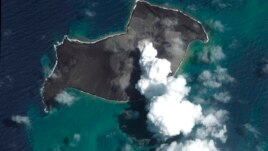19 January 2022
The eruption Saturday of the Hunga Tonga Hunga Ha'apai undersea volcano lasted 10 minutes. But smoke and gas from the volcano rose over 30 kilometers into the air.
It was among the world's largest volcanic eruptions in the past 30 years, said New Zealand scientist Shane Cronin. He is a volcano expert at the University of Auckland.
He and Emily Lane, a tsunami expert at New Zealand's National Institute of Water and Atmospheric Research, explained why the volcanic eruption was so big.

This satellite image provided by Maxar Technologies shows an overview of Hunga Tonga Hunga Ha'apai volcano in Tonga on Jan. 6, 2022, before a huge undersea volcanic eruption. (Satellite image ©2022 Maxar Technologies via AP, File)
Why was the eruption so big?
The magma inside the volcano was under enormous pressure and had gasses trapped within it. Magma is the hot liquid rock inside volcanoes.
An opening in the rock let the gas expand, which blew open a hole for the magma to escape. The main part of the volcano is about 200 meters below the sea. When it blew up, sea water poured in and turned to steam. This added to the energy of the explosion.
A tsunami travels across the ocean
A single eruption produced a tsunami of about one meter that crossed the Pacific Ocean. It damaged boats in New Zealand and caused an oil spill and two drownings in Peru. The tsunami surprised scientists because most are caused by large, undersea earthquakes that extend across large areas. The Tonga eruption was at one small area in the ocean.
Lane said one theory is that the shock wave from the volcano, which traveled around the world twice, may have given more power to the tsunami waves.
Tonga escaped the worst damage
Scientists are also uncertain why the tsunami was not bigger or more destructive in Tonga. The Polynesian kingdom of many islands sits almost on top of the volcano.
"That's the million-dollar question," Cronin said. "Looking at the images so far, the level of devastation is less than I was fearing."
By Wednesday, officials had confirmed three deaths in Tonga. Many homes were destroyed.
Lane said that Tongans got an early warning. It came from the increased activity at the volcano the day before the eruption and from the loud noise when the blast took place. Tongans had time to get to higher ground before the tsunami hit.
Lane said undersea formations that surround the many islands may also have protected parts of Tonga.
Falling rock dust and ash
The ash that has covered Tonga is acidic, but not poisonous, Cronin said. He has been telling aid workers that people can drink from their water supplies even if some ash has fallen in.
New Zealand and other nations are trying to get water and other supplies to Tonga as quickly as possible.
Cronin said all of Tonga's soil comes from volcanic ash and the latest amount of ash will quickly wash into the ground. It will also improve the soil for planting.
No global cooling
Large volcanic eruptions can sometimes cause temporary cooling around the Earth. But the Tonga eruption released only a small amount of sulfur dioxide, which scientists have linked to cooling. Alan Robock is a scientist at Rutgers University in New Jersey. He said the eruption will cause a cooling of only 0.01 degree Celsius.
What will happen next?
Cronin says the volcano may have exhausted itself and could go quiet for the next 10 to 20 years. But it is also possible there may be additional eruptions as new magma rises up quickly. Both Cronin and Lane agree the volcano needs to be watched closely to better predict future events.
I'm Susan Shand.
The Associated Press reported this story. Susan Shand adapted it for Learning English.
______________________________________________________
Words in This Story
eruption – n. to send out rocks, ash, and lava in a sudden explosion
tsunami – n. a very high, large wave in the ocean that is usually caused by an earthquake under the sea and that can cause great destruction when it reaches land
devastation – n. to destroy much or most of (something) : to cause great damage or harm to (something)
exhausted – adj. to completely use up
We want to hear from you. Write to us in the Comments Section, and visit 51VOA.COM.